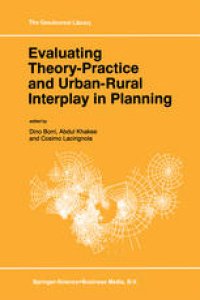
Ebook: Evaluating Theory-Practice and Urban-Rural Interplay in Planning
Author: Andreas Faludi Willem Korthals Altes (auth.) Dino Borri Abdul Khakee Cosimo Lacirignola (eds.)
- Tags: Environmental Management, Economic Policy, Geography (general), Environmental Economics
- Series: The GeoJournal Library 37
- Year: 1997
- Publisher: Springer Netherlands
- Edition: 1
- Language: English
- pdf
This volume contains a selection of papers presented at the second workshop on Evaluation and Planning held at Centre International de Hautes Etudes Agronomiques Mediterraneennes (CIHEAM) in Valenzano (Bari) in November 1993. The workshop was financially and otherwise supported by the School of Engineering, Bari Polytechnic; the School of Agriculture, University of Bari; and CIHEAM. The publication of this book was made possible by to the efforts of the contributing authors. Several other persons have provided invaluable support for the workshop or the preparation of this volume. One of these is Patsy Healey for her fascinating challenge to Andreas Faludi's most recent arguments about rational planning theory. Another is John Friedmann whose lecture at the workshop presented world future scenarios depicting interaction between economic growth, social justice and ecological balance. Angela Barbanente provided marvelous support in organizing the workshop and editorial advice in the preparation of this volume. Jeremy Franks carefully improved the English and the clarity of all the papers. Carmelo Torre made a final editing of texts and images. We owe thanks to Maurizio Raeli for providing all the support services during the workshop and Claudia Baublys for her excellent help with various administrative issues with regard to the workshop and publication of this book. This book is dedicated to the memory of Professor Giovanni Grittani, Professor of Land Economics, University of Bari.
This interdisciplinary volume explores the evaluation of theory-practice and growth-conservation interactions in planning. Over the past years traditional evaluation methods have disregarded various aspects in decision-making, such as uncertain value conflicts, ecological imperative use of non-expert knowledge, and citizen participation. This volume presents an incentive to examine the evaluation methods used by means of a number of chapters on case studies.
Audience: This book will be of interest to scientists, researchers and practitioners in urban, regional and strategic planning, urban and social history, social geography, public administration and policy sciences.